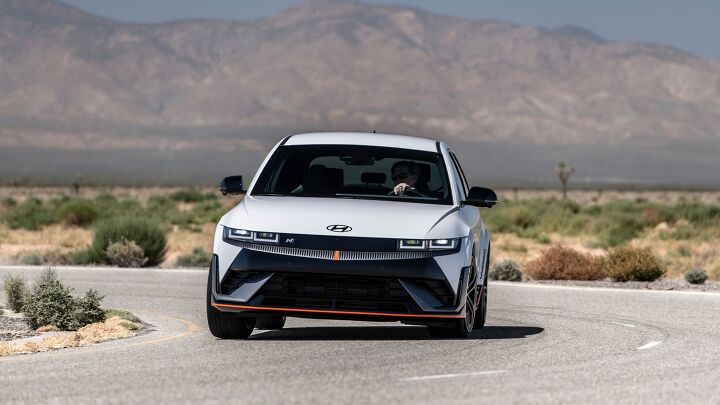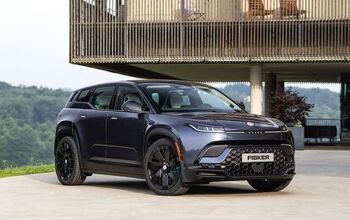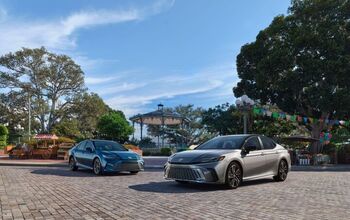The 2025 Hyundai Ioniq N Will Land With an Almost $70,000 Price Tag

Hyundai is expanding its “N” performance line with the new electric Ioniq 5 N, which will land as a 2025 model. The automaker recently priced the hot EV, making it the most expensive vehicle in its lineup in the United States.
The Ioniq 5 N comes with a hefty $67,475 price tag, which includes a $1,375 destination charge. That price makes it more expensive than the Hyundai Nexo fuel cell vehicle by about five grand and a whopping $25,000 pricier than the cheapest “regular” Ioniq 5. It’s also around $5,000 more than the Kia EV6 GT, the closest rival to the Ioniq 5 N.
Of course, that money buys a lot of performance and plenty of features. Hyundai is selling the EV as a single trim, so it gets all the goodies that would otherwise cost extra. In addition to the power output, which at 601 horsepower and up to 641 ponies with temporary boost engaged, is prodigious and a low-three-second 0-60 mph time, it gets a sporty but well-trimmed interior, plenty of tech, and a load of safety kit.
Hyundai also made substantive updates to the Ioniq 5’s propulsion system, including an upgraded thermal management system to prevent battery damage during extreme track driving. Selectable drive modes let the driver dial in performance and energy consumption. The Endurance mode limits peak power output to conserve battery on the track, while Sprint gives full juice for the fastest lap times.
Inside, the hot SUV gets a unique steering wheel design with the N logo and a center console optimized for track driving. It offers a knee pad and shin support, and the armrests are adjustable. Finally, its sport seats come wrapped in synthetic suede and offer heating and ventilation.
[Image: Hyundai]
Become a TTAC insider. Get the latest news, features, TTAC takes, and everything else that gets to the truth about cars first by subscribing to our newsletter.

Chris grew up in, under, and around cars, but took the long way around to becoming an automotive writer. After a career in technology consulting and a trip through business school, Chris began writing about the automotive industry as a way to reconnect with his passion and get behind the wheel of a new car every week. He focuses on taking complex industry stories and making them digestible by any reader. Just don’t expect him to stay away from high-mileage Porsches.
More by Chris Teague
Latest Car Reviews
Read moreLatest Product Reviews
Read moreRecent Comments
- Ted Bryant Agree with Mikey.Manual. Any manual transmission car. 1) can't text-and-drive, 2) forces driver to pay attention, 3) perfect security because most thieves can't drive stick, 4) fun to drive, 5) friends won't drive the car (they can't drive stick), 6) compression start -- never get stuck, and 7) will always be able to drive any vehicle anywhere. Did this for both kids -- after a couple weeks of complaining, they finally got to it, and now only drive manual. And they are both great drivers. But their friends do poke them for driving stick -- "oh neat - a manual. do you bake your own bread and sew your own clothes too..."
- Mikey My youngest girl ( now 48 ) dated a guy that had a Beretta with a stick shift. The Dude liked Beer and weed. too much for my liking..I borrowed my buddy's stick shift Chevette and give her short course on driving a manual .. I told her if the new BF has more than 2 beer or any weed ..You drive ...I don't care how many times you stall it, or or of you smoke the clutch . She caught on quite well ,and owned a succession of stick shift vehicles...An as an added bonus she dumped the guy.
- Blueice "Due to regulation/govt backing, China is poised to dominate BEV/battery production, just as they do solar panel production, drone production, etc.Taiwan dominates production of certain types of chips due to regulation/govt backing and we saw how precarious such a situation is (especially with the PRC increasingly becoming aggressive towards Taiwan).That's why regulation/govt backing is aiming to build up local chip manufacturing."BD2, these businesses and or industries are not free market enterprises, buttcorporatist, bent on destroying their competitors with the use of governmentalunits to create monopolies. How safe are world consumers when the preponderance of computer chipsare made in one jurisdiction. Do you what Red China controlling any industry ??And it is well known, concentrated markets control leads to higher prices to end users.
- Master Baiter I told my wife that rather than buying my 13YO son a car when he turns 16, we'd be better off just having him take Lyft everywhere he needs to go. She laughed off the idea, but between the cost of insurance and an extra vehicle, I'd wager that Lyft would be a cheaper option, and safer for the kid as well.
- Master Baiter Toyota and Honda have sufficient brand equity and manufacturing expertise that they could switch to producing EVs if and when they determine it's necessary based on market realities. If you know how to build cars, then designing one around an EV drive train is trivial for a company the size of Toyota or Honda. By waiting it out, these companies can take advantage of supply chains being developed around batteries and electric motors, while avoiding short term losses like Ford is experiencing. Regarding hybrids, personally I don't do enough city driving to warrant the expense and complexity of a system essentially designed to recover braking energy.


































Comments
Join the conversation
Seems silly to quibble about a $67k Hyundai Ioniq in a world of $77k Dodge Durango SRTs that the Hyundai would show its taillights to.
WAIT! We all know Hyundai’s and Kia’s MO. We wait a few months, let the full priced guys buy their cars. We get I5N at steep discounts. The EV6 GT are selling at 45-47k with a few thousand miles on them. New, they are selling 10k off MSRP. No difference for the I5N!